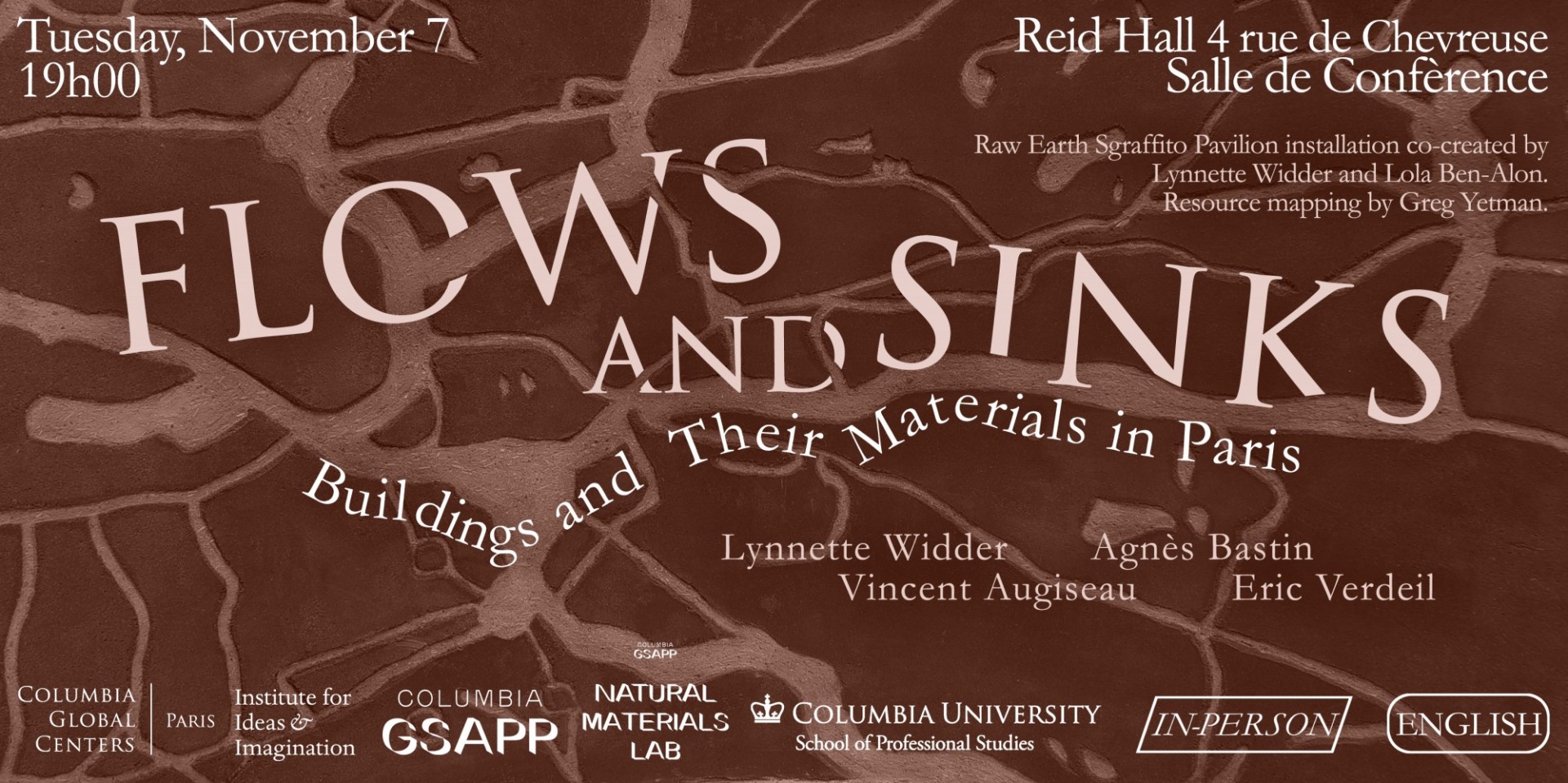This event will be held in English.
Co-sponsored by Columbia Global Centers | Paris, the Institute for Ideas and Imagination, Columbia GSAPP, GSAPP Natural Materials Lab, and Columbia School of Professional Studies.
The Reid Hall Caféothèque will be open before the event with wine and snacks for sale.
Flows and Sinks
In the context of man made environmental change, how can we change the way in which materials are sourced for construction? How can we increase the use of local materials? What does it take to properly measure how these materials are moving?
Using the Raw Earth Sgraffito Pavilion in Reid Hall’s courtyard as a physical point of reference, this event will consider the metabolism of construction material in Paris, in particular the materials used in the pavilion – unfired stabilized soils, agricultural by-products, wood and natural sealants – and Paris’ unique construction transportation network. The conversation will extend beyond analysis to proposals for more environmentally responsive construction practices.
As of 2005, human activity was moving more material on earth than natural processes. Construction alone accounts for 30% of these anthropogenic shifts, which operate at rates nearly 40% faster than those caused by natural erosion and sedimentation (Wilkinson, 2005) . At stake is not only the quantities of earth in motion, but also the rates at which that movement is occurring.
These larger phenomena register in the rate at which construction material moves through cities. In Paris, more than 33.5 Mt of construction material are deployed each year (Augiseau, 2020), much of it aggregate and other non-metallic minerals such as gypsum and sand. The greatest density of in-built material is at the city’s historic center, but that stock is also in flux. Energy efficiency requirements, regular upkeep, weathering and changing consumer demands create an ongoing need for materials used in renovation and rehabilitation. Trucking and conveyance in Paris’ narrow, non-orthogonal streets is difficult, and the city’s environmental regulation specific, giving rise to unexpected transportation methods.
Panelists
Lynnette Widder's current research includes work on urban diaspora and non-cultivated plant life, sustainable bauxite mining in West Africa (with the UN Development Program), earth construction and its environmental implications (with Lola Ben Alon and Greg Yetman), and innovation in climate change communication (Climate School Earth Networks). She is the author of Year Zero to Economic Miracle: Hans Schwippert and Sep Ruf in Postwar West German Building Culture (2022) and co-authored Architecture Live Projects: Pedagogy into Practice (2014) and Ira Rakatansky: As Modern as Tomorrow (2010). Her non-fiction has appeared in the Oxonian Review, Daidalos, Bauwelt, Architecture, Manifest, Kritische Berichte, the Journal of Industrial Ecology, and The Social Science Journal; and her fiction, in Northwest Review, Blue White and Camera Obscura. She was a fellow at the Institute for Ideas and Imagination in 2021.
Vincent Augiseau holds a PhD in urban planning. He is the co-founder of CitéSource, a consulting and research company specialized in innovative assessment methods for circular economy. He analyzed the metabolism of Paris and its region and focused on construction materials.
Agnès Bastin has a PhD in urban studies (CERI, Sciences Po Paris) and is currently a postdoctoral fellow at ISIGE Mines Paris PSL. Her PhD analyzes the management of construction and demolition materials, in particular concrete and excavated soil, and local circular economy policies in Paris and Brussels. Her work falls within the field of territorial ecology and, more generally, focuses on transformations in territorial metabolism, the governance of material flows and the ecologisation of planners' practices.
Eric Verdeil is a professor of Geography and Urban Studies at Sciences Po, Paris. His interests include the sociology and history of urbanism and the political ecology of urban infrastructure.
Project Contributors
Raw Earth Sgraffito Pavilion installation co-created by Lynnette Widder and Lola Ben-Alon. Resource mapping by Greg Yetman.
Greg Yetman is associate director for the Geospatial Applications Division at CIESIN. He is a geographer specializing in the application of geographic information system (GIS) technologies in applied and research fields, including population geography, natural disasters, and environmental assessment.
Lola Ben-Alon is an Assistant Professor at Columbia GSAPP, where she directs the Natural Materials Lab and the Building Tech curriculum. She specializes in socially and environmentally sustainable building materials, construction practices, and engineering-architecture collaborations. Her current work focuses on natural earth- and bio-based building materials, their manual and digital fabrication, life cycle, supply chains, and policy. She uses quantitative and qualitative methods to evaluate the embodied and operational impacts of low-carbon assemblies such as cob, rammed earth, and light straw clay.
The place
To be notified of our upcoming events, we invite you to sign up for our fortnightly newsletter.
This event will take place in the Grande Salle Ginsberg-LeClerc, built at Reid Hall in 1912 and extensively renovated in 2023 thanks to the generous support of Judith Ginsberg and Paul LeClerc.
For nearly 60 years, Columbia University students and faculty have come to study, teach, and pursue their research at Reid Hall, home to Columbia Global Centers | Paris. Nestled in the Montparnasse district, Reid Hall also hosts several other Columbia University initiatives: Columbia Undergraduate Programs, M.A. in History and Literature, GSAPP Shape of Two Cities Program, and the Institute for Ideas and Imagination. This unique combination of resources is enhanced by our global network whose mission is to expand the University's engagement the world over through educational programs, research initiatives, regional partnerships, and public events.
From graduate and undergraduate courses to webinars attracting audiences worldwide; from executive training to artist residencies, the Paris Center is a hub for scholars, students, and artists who cross both disciplinary and national boundaries alike. Through its public programs, the Center also addresses pressing global issues that are at the forefront of international education and research: agency and gender; climate and the environment; critical dialogues for just societies; encounters in the arts; and health and medical science.
The views and opinions expressed by speakers and guests do not necessarily reflect the official policies or positions of Columbia Global Centers | Paris or its affiliates.
